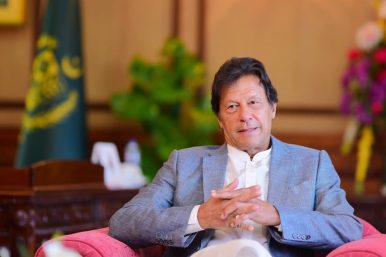By Rajeswari Pillai Rajagopalan
Pakistani Prime Minister Imran Khan is set for his maiden visit to the United States in the next few days. The trip will include a stop at the White House as well. Reports indicate that the delegation will comprise of officials such as the foreign minister, Shah Mehmood Qureshi, the trade and investment adviser, Razzak Dawood, finance adviser Hafeez Pasha, and security officials including the army chief, General Qamar Javed Bajwa, the ISI chief, Faiz Hameed, and the head of the ISPR Major General Asif Ghafoor.
As with these sorts of the visits, the composition of the delegation gives a sense of the potential agenda, particularly on the security side. This will likely include Afghanistan as well as trying to reset the “acrimonious relationship” between Washington and Islamabad which has been playing out of late.
Afghanistan is likely to be a key issue of discussion during Imran Khan’s meetings in the United States, including with President Donald Trump and members of the U.S. Congress. The Pakistani Foreign Office in a statement highlighted “Pakistan’s commitment to peace and stability and the importance of constructive engagement to promote a political solution in Afghanistan.” Foreign Minister Qureshi is reported to have said recently at an interaction that Pakistan “has been facilitating the U.S.-Taliban talks in good faith, underscoring that it remains a shared responsibility.”
With the election campaign picking up pace in the United States, President Trump also has a strong incentive to push for an Afghanistan solution. Ending one of America’s longest military engagements would make Trump look good. Despite being critical of Obama’s handling of Afghanistan, Trump in fact increased the U.S. military presence in Afghanistan. That, however, has had little impact on the war.
The U.S. effort to find a peaceful exit is not going to be easy. The Taliban demand for complete U.S. military withdrawal is one big stumbling block. Washington has been trying to get Islamabad to put pressure on the Taliban to show some flexibility.
Just a few days ago, Pakistan scored a major diplomatic victory, getting an invitation from the United States, Russia and China to help craft a long-term solution to the Afghanistan problem. The request to Pakistan to join the Afghan peace talks came after the third round of U.S.-China-Russia consultations on Afghanistan in Beijing on July 10-11. India, its regional nemesis, has been pushed to the sidelines.
Though India had made significant investments to the tune of more than $2 billion in Afghanistan – constructing one of the largest hospitals for women and children, schools, the Salma Dam (called the Afghan-India Friendship Dam) and the new parliament building – no one seems particularly interested in New Delhi’s views on the situation in Afghanistan.
During the recent visit of the U.S. Secretary of State Mike Pompeo, India’s National Security Adviser Ajit Doval is reported to have aired Indian concerns, but to no avail. India maintains that Afghanistan’s election schedule should be unaffected even if the peace process is on. India was also at odds with both Russia and the U.S. special envoy, Zalmay Khalilzad, on the idea of an interim government in Afghanistan.
Terrorism is another major issue on the agenda. As in the past, Pakistan has arrested a high-profile terrorist – Hafiz Saeed, the mastermind behind the 2008 Mumbai attack – before the premier’s visit to the United States. Such arrests have usually been inconsequential. But Islamabad would like to milk it as much as possible, and hope that the United States will reinstating some of the Coalition Support Funds that were suspended by the Trump Administration.
Recall that in the beginning of 2018, Trump asserted in a tweet that the United States has “foolishly given Pakistan more than 33 billion dollars in aid over the last 15 years and they have given us nothing but lies & deceit.” He went on to add that Pakistan is providing safe haven to the very terrorists that the United States is fighting against in Afghanistan. Actions have since followed. The United States held back a total of $800 millionfrom Pakistan last year.
Imran Khan will make every effort to convince the United States of Islamabad’s sincerity in the fight against global terror. Given that the United States needs to accommodate Pakistan in order to find a face-saving exit from Afghanistan, he might get lucky.
Pakistan would also like to turn a page on the bad relations with the United States. Imran Khan has been in office for almost a full year, but this is his first visit to the United States, a reflection of this bad relationship. The current difficulties in U.S.-India relations may also encourage Islamabad to think it can gain some sympathy in Washington.
Pakistani security analysts claim that there is also another concern for Islamabad – “a growing disenchantment with the China-Pakistan Economic Corridor.” Reports indicate a deep skepticism within Pakistan about the CPEC, which is seen as “on the verge of dying.” This is not to suggest that Pakistan will give up on its all-weather friendship with China but Pakistan would like other options than just Beijing.
It is too early to say how successful Khan’s visit will be, and we will have to assess things once the trip has concluded. But there are clearly incentives on both sides to improve the relationship, and broader strategic shifts could provide the room for them to do so at least to some degree.

No comments:
Post a Comment